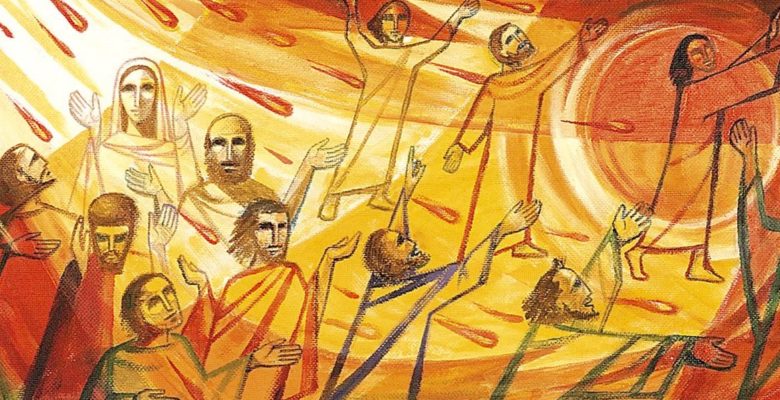If this is your first viewing, please see my Introduction before reading this.
29 November. Acts chapters 1-3
Have you eve been in a situation where you had to “think on your feet” – to react with no time for preparation to an unexpected change of circumstances? It might have been a sudden death in the family, a serious illness, or unemployment; or more positively an unexpected lottery win or someone close to you announcing their engagement when you hadn’t even known they were in love. Or you might have been asked at work to take over someone else’s role; or to give a speech with no time to plan what you were going to say.
Whatever the circumstances, the natural human reaction to such occasions is twofold – the thrill of a challenge, brought on by a rush of adrenalin, and nervousness in case it all goes horribly wrong. We are all made differently: for some people it is the thrill that dominates, and for others the nerves. Or you may have found yourself oscillating between the two. Is this my big break, or my undoing? Can I rise to the challenge, or will it defeat me? Those who overcome tend to be those who have coped with other challenges before.
Peter had to do a lot of thinking on his feet in the weeks around Jesus’ death and resurrection. It had not been long, perhaps a few months, since he and his closest friends had been up the mountain with Jesus and seen him transfigured into glory. Peter knew then that Jesus was the Messiah, the promised one from God. Yet weeks later he had heard the crowds baying for blood, and seen Jesus on trial. At that time nerves got the better of him, and he denied his master three times in a matter of hours. Later that day Jesus hung on the cross and it all seemed over. He had witnessed the burial.
But also the empty tomb, two days later, made him think on his feet again – what had happened to the body? And then the many appearances over forty days of his master alive again (Acts 1:3). Had the death been an illusion? Then, just as they were getting used to Jesus being alive, he disappeared from sight (1:9) with mysterious words about the Holy Spirit and power. No wonder they were all confused. Gain, loss, gain, loss, – what would come next? The rituals and rhythms of Temple prayer were a comfort to hold on to.
Now on the day of Pentecost their world is turned upside down again as the promised Holy Spirit comes in a most unexpected way. Fire, rushing wind, and an irresistible urge to praise God that comes pouring our of their mouths in languages unknown to the speakers but understood by the foreigners in the street outside. They accuse the disciples of being drunk at nine in the morning! And Peter, the uneducated Galilean fisherman, finds himself thrust forwards as the spokesperson for them. Time to think on your feet, Pete.
But this time it is not nerves that force him into denial. No, it is the rush that compels him to speak. Not just the rush of adrenalin in his body but the rushing wind of the Holy Spirit in his soul. For Peter has had a revelation, like that which would seize Saul a few months later. Jesus is the Messiah, not just for Jews but for the world.
It was just as Jesus had promised, “when they bring you to trial and hand you over, do not worry beforehand about what you are to say; but say whatever is given you at that time, for it is not you who speak, but the Holy Spirit” (Mark 13:11). Peter found himself giving a sermon that convinced not a few, but thousands of hearers that they must repent and be baptised. No wonder the day of Pentecost is called the “birth of the Church”. For Christians it is as important as Christmas or Easter.
Is this of any help if you or I find ourselves caught out, surprised, having to think on our feet? Surely we can’t expect the Holy Spirit to be poured out on us like that, can we? Well, not quite like that. But the Spirit is ever-present, and the words of Jesus recorded at the end of Matthew’s gospel “And remember, I am with you always, to the end of the age”, do hold true. The worse the predicament we think we are in, the closer he will be to us. In desperate circumstances, some people even see angels. And if we pray, however simply but sincerely, for guidance the Spirit will be with us to guide us to react appropriately. She may even give us words to speak, as Peter found.
That’s not to say that everything will be happily ever after for us. As Peter found, his new ministry as leader of the Christian church in Jerusalem was not without persecution. Jesus never promised an easy life. But he did promise that his Holy Spirit would be available whenever needed.
